A huge congratulations to Dr Ben Arthur on receiving the Tasmanian STEM Communicator of the Year Award at this year’s Tasmanian STEM Excellence Awards. Ben received this award for “delivering creative STEM storytelling from the classroom to the boardroom to engage people across Australia on a wide range of marine issues”.
Ben became a CMS member earlier this year, and is also member of the Tasmanian Marine Science Engagement and Extension Group that is hosted by CMS.
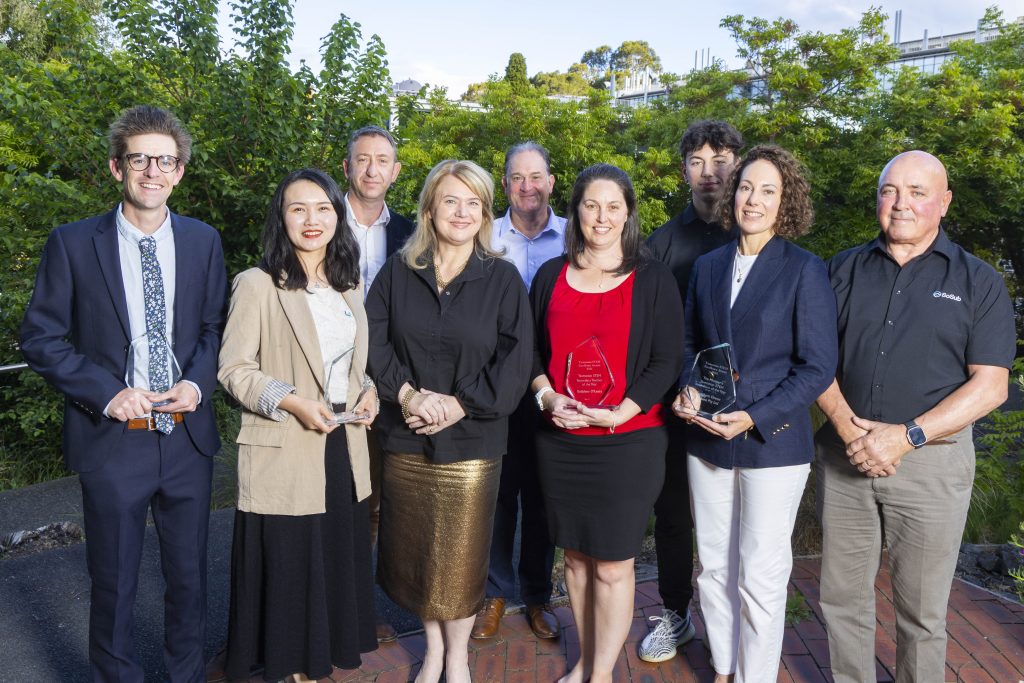
CMS Director Prof Gretta Pecl (AM) recently had a Q&A session with the Marine Stewardship Council (MSC), during Seafood Directions 2024 in Tasmania.
Prof Gretta Pecl discusses her career and mentors, as well as topics like climate change, food security, and protecting marine ecosystems. Gretta highlights the need for adaptive marine management and reflects on the emotional challenges of climate work and the hope she draws from younger generations advocating for change.
Check out the interview here:
MSC Blog post: In conversation with Professor Gretta Pecl AM | Marine Stewardship Council (msc.org)
MSC Fresh Catch Newsletter (Oceania): Oceania Fresh Catch Newsletter (mailchi.mp)
MSC video interview: https://youtu.be/DBsuI0fZEwM
CMS Director Prof Gretta Pecl recently received her medal for her appointment as a Member of the Order of Australia (AM), as part of the King’s Birthday 2024 Honours List.
The Investiture Ceremony was held at the Tasmanian Government House in September 2024, with Her Excellency the Honourable Barbara Baker (AC) awarding the medals.
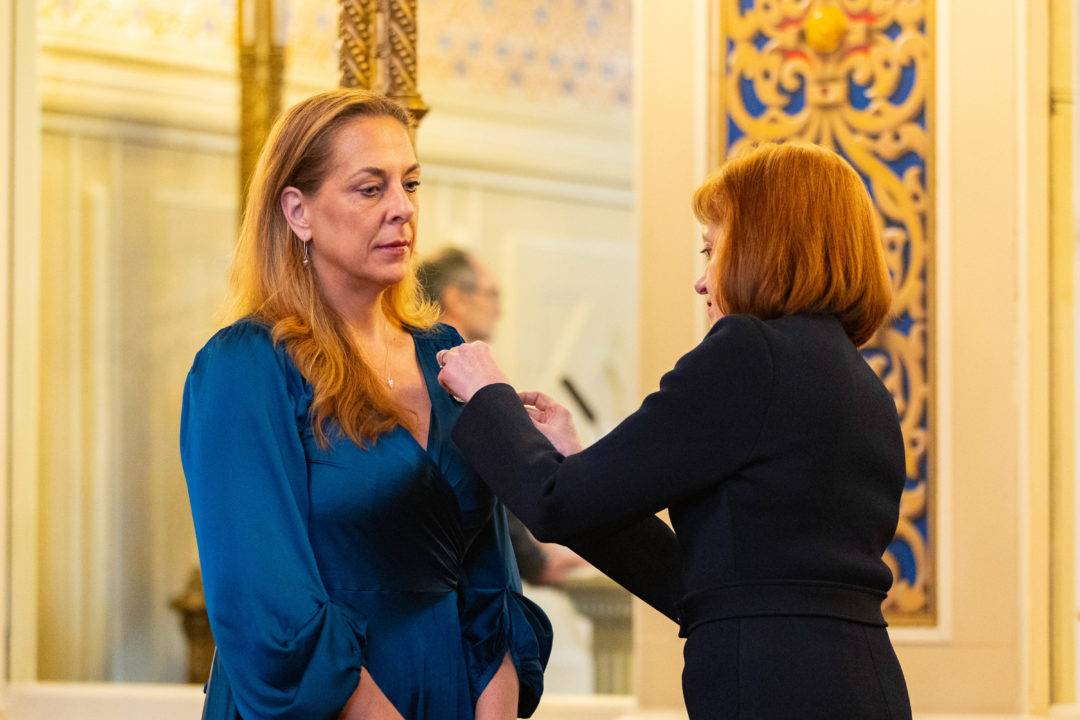
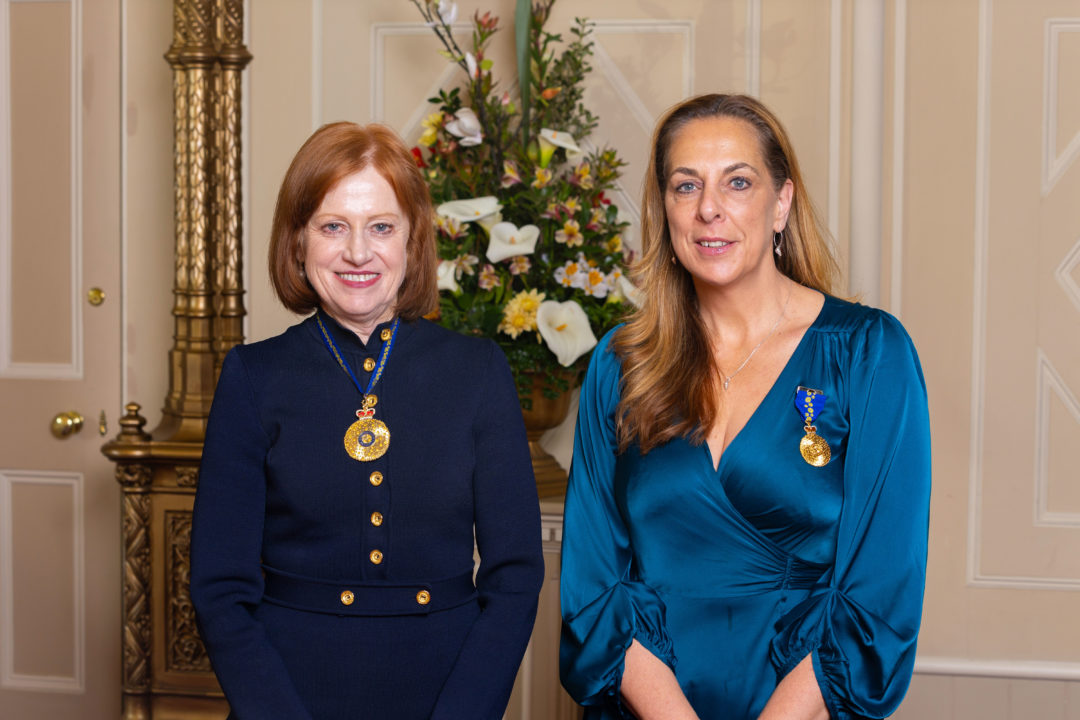
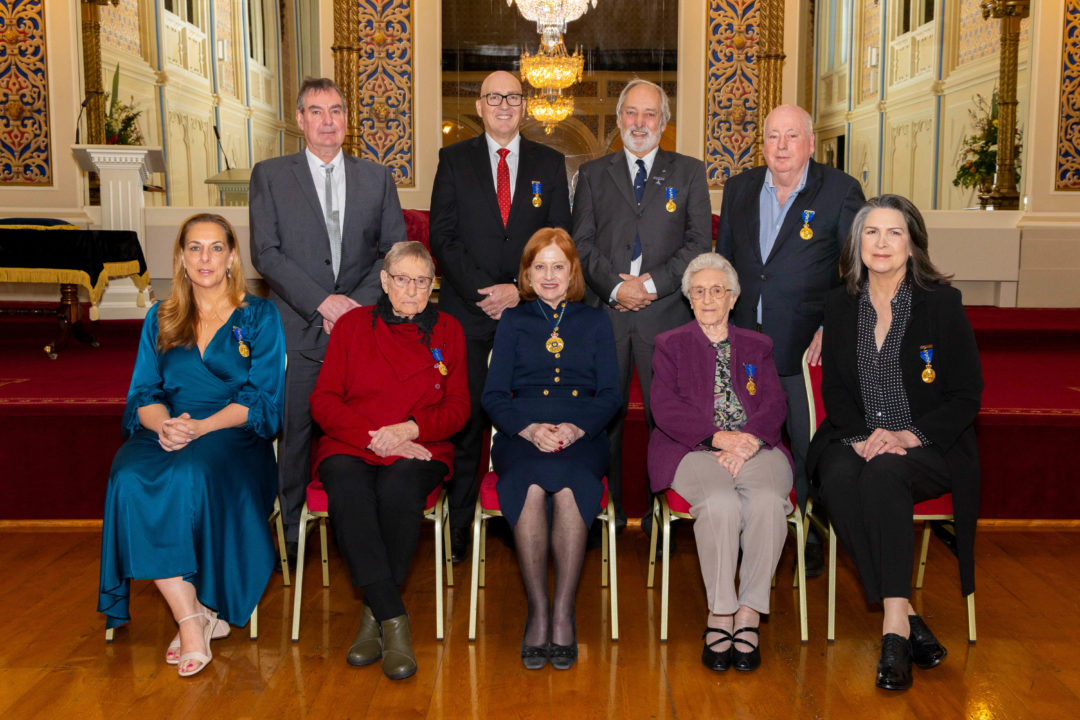
The BigFish Card Game is a new fun game about sustainable fishing and ocean literacy, and was developed by CMS members Matthew Testoni and Asta Audzijonyte, along with Amy Coghlan. The game is now ready to go public, but needs help to get to off the sediment!
You can view the Big Fish Card Game - Kickstarter page and make a pledge to support this game to get it up and swimming.
In order to keep going they need to reach their stretch goals, which will enable them to take the game to schools and develop a collaborative game version. They are already close to the minimum goal, but there is a lot more that can be achieved! You can ready their inspiring story on the Kickstarter page.
ABC media interview (skip to minute 10): https://www.abc.net.au/listen/programs/tas-country-hour/tasmanian-country-hour/104346534?utm_content=link&utm_medium=content_shared
Media interview: https://au.news.yahoo.com/hunt-for-worlds-last-giant-fish-as-researchers-find-clues-in-ancient-photographs-012947944.html
Background:
Big Fish is an exciting new card game where you compete to become Tasmania's #1 fisher. To win you'll have to choose which fish you catch and which you leave behind to make sure your fishing spot stays healthy.
Big Fish is a fun game all about sustainable fishing and ocean literacy. The game is designed be both engrossingly fun and a learning experience. So whether you like catching fish or managing you fishing spot you will love Big Fish.
Big Fish is also run as a NOT FOR PROFIT project, 100% of the money raised goes back into increasing ocean literacy and knowledge on how to fish sustainably. Ways we give back include and are not limited to school outreach, events and public engagement activities, stakeholder engagement, curriculums and don't forget EXPANSIONS of Big Fish that contain even more awesome ocean knowledge!
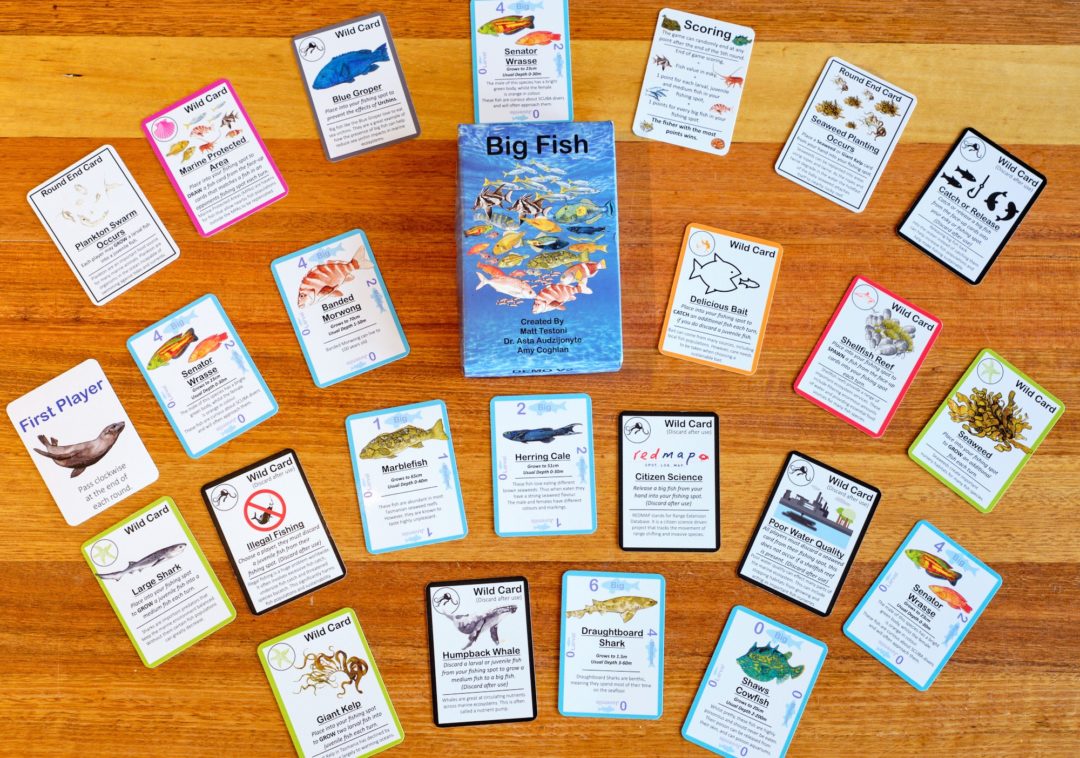
Congratulations to CMS members Dr Chloe Lucas and Dr Phillipa McCormack on receiving 2025 ARC DECRA (Discovery Early Career Researcher Award)!
CMS also wants to recognise the academics that worked hard on good proposals that were unfortunately not successful – we know how much work and hope goes into these!
Dr Phillipa McCormack was awarded $482,990.
Project Summary: Preparing Australia for a fiery future: Five strategies to guide law reform. Australia does not have the necessary legal frameworks to proactively mitigate bushfire risks. This project aims to support effective, equitable, and timely fire mitigation through law reform. By pioneering holistic assessment of adaptation in state fire laws, and drawing novel insights from international case studies (Canada, Spain and USA) and active stakeholder input, expected outcomes include practical pathways for law reform and new international networks for exchanging knowledge. Outputs to guide more effective implementation of evidence-based legal reform are expected to assist policy makers to enact improved fire prevention, benefitting fire agencies, communities, and ecosystems to thrive in a future increasingly defined by fire.”
Dr Chloe Lucas was awarded $487,736.
Project Summary: Helping Citizens Share Responsibility for Democratic Climate Adaptation. This project will create new tools to help citizens participate in democratic dialogue about climate change adaptation. Climate change impacts the lives of Australians, including through more frequent and intense bushfires, floods, heatwaves, droughts and storms. However, most citizens are not given the opportunity to be involved in government decisions about how to plan for and manage these risks. This project explores games and play-based forms of group deliberation as ways to engage a wide range of citizens in setting agendas for climate adaptation policy and planning. It will identify diverse perspectives and priorities, and start place-based conversations between citizens and governments about how to thrive in a climate-changed world.
See all successful projects here: https://rms.arc.gov.au/RMS/Report/Download/Report/a3f6be6e-33f7-4fb5-98a6-7526aaa184cf/265
Powering Locally Led Inclusive Community Based Conservation, Research and
Sustainable Development Approaches Blue Pacific.
Speaker: Rachel Sapery-James (Senior Manager Blue Pacific, World Wide Fund for Nature (WWF))
Recording Date: 25th July 2024
The recording for this webinar is now available here.
Brief Abstract:
Rachel will delve into the transformative ambition of WWF’s Blue Pacific Programs, her leadership to
elevate traditional Indigenous knowledge and inclusive conservation practices. Prioritising local leadership, value systems, and the revitalization of customary governance, ensuring that both People and Nature thrive across the Pacific. The discussion highlights the urgent need to enhance cultural ompetency among staff and practitioners, raising awareness and advocating for the decolonization of erspectives and approaches. By empowering First Nations, local communities to lead and design conservation effort, be active leaders in design architecture of research and development programs, we foster a more collaborative approach and long-lasting solutions. Key themes include: Bridging Western science with traditional wisdom to bolster community climate resilience, Inclusive Ocean Science Academia Training, Community-based fisheries and marine ecosystems management in Melanesia (PNG, Solomon Islands and Fiji). Through policy engagement and respectful meaningful long-term partnerships, we will showcase three case studies demonstrating the successful implementation of these inclusive and community-led initiatives. A climate lens remains central to all our efforts, ensuring sustainability and climate resilience.
Girringun: Nguri - Indigenous rangers tell ancient stories of the Great Barrier Reef | WWF-Australia - https://www.youtube.com/watch?v=D2b_e5NOylw
WWF Pacific – WWF Solomon Islands – Western Province Seascape, Scaling Sustainable Sea-grapes - Community Based Management https://www.youtube.com/watch?v=MBqzHi4jDXE
WWF Pacific – WWF Solomon Islands - A Blueprint for a People and Nature Positive Pacific - https://www.youtube.com/watch?v=j_PZdve3nyI&t=27s
Sea Women Melanesia Papua New Guinea Sea Women of Melanesia 2021 Champion of the Earth - Inspiration and Action - https://www.youtube.com/watch?v=zHx0rrWZmI8&list=PLgo8ocnrcJsuFc-YEZS9-DeSrJpgVIPHH
Bio:
Rachel Sapery-James is a Marine Biologist specializing in Social Environmental Systems and addressing complex challenges affecting both communities and nature. Her work focuses on leveraging Nature Solutions and Indigenous Knowledge to tackle the Climate Crisis, thereby enhancing Community Resilience throughout the Blue Pacific. Rachel earned her MSc from Bremen University’s ZMT in Germany.
She also completed a postgraduate research diploma and post graduate research certificate in sea cucumber aquaculture hatchery and juvenile grow-out techniques at James Cook University. Additionally, Rachel holds a Bachelor of Science in Marine Biology and Aquaculture from James Cook University in
Townsville.
Congratulations to CMS member Dean Greeno, who was named a finalist in the country's most prestigious First Nations art award - the National Aboriginal & Torres Strait Islander Art Awards!
Dean's placing artwork, a paperbark, reed, plywood and driftwood sculptural piece called tunapri milaythina muka, which in English means to know sea country through making, is his view of his cultural heritage.
Inspired by the history of his family on Cape Barren Island, and his own time growing up there, Greeno, a truwulway pakana man, has "wrapped traditional canoe making inside of ship building and contemporary design" in a "physical and spiritual link to his ancestral past".
Read the article in The Examiner here: https://www.examiner.com.au/story/8717636/dean-greeno-named-finalist-in-countrys-most-prestigious-first-nations-art-award/
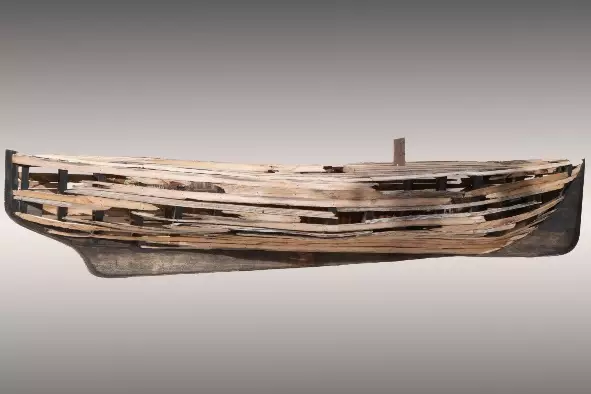
Dean Greeno's tunapri milaythina muka, To know Sea Country through making, a finalist in the National Aboriginal & Torres Strait Islander Art Awards. Picture source: The Examiner
CMS Director Prof Gretta Pecl recently sat down with CMS member Matt Testoni on the Seacreatures Podcast to talk about squid!
Listen here: Episode 51: Squid with Gretta Pecl
In this episode Matt chats to squid and climate scientist Gretta Pecl all about the amazing world of squid! From their bizarre and various mating behaviours to why their skin and ink is so cool. If you love squid facts this is the episode for you!
Check out Gretta's citizen science project REDMAP here:
https://www.redmap.org.au/
Gretta's squid articles here:
https://www.redmap.org.au/article/squid-the-biology-basics/
https://www.redmap.org.au/article/squid-mating-calamari-nuptials/
and Gretta's Youtube special all about these cephalopods here:
https://www.youtube.com/watch?v=PKqRAaxsykw
Visit the Seacreatures Instagram:
https://www.instagram.com/seacreatures_podcast/
Check out Matt Testoni's photography on Instagram
https://www.instagram.com/matt_testoni_photography/
or at
https://www.mtunderwatermedia.com
The recent workshop, co-hosted by CMS, convened a diverse group of experts, including teams from various CSIRO business units, alongside researchers from the University of Tasmania, Queensland University of Technology, the University of Queensland and others. The event aimed to address the evolving role of artificial intelligence in socio-ecological modelling and to prepare the community for the changes and opportunities that are on the horizon with the advancement of AI technologies.
Participants engaged in thought-provoking sessions and breakout discussions, focusing on the strengths and weaknesses of end-to-end AI modellers, and the degree of trust that should be placed in AI. These discussions also explored the skills required to effectively work with AI in the field, how to sustain existing expertise, and the potential for specialized AI to support human efforts. Looking forward, the workshop examined strategic pathways for AI in ecosystem modelling, the possibility of unique collaborations with technology leaders, and preparations for changes anticipated over the coming years.
The workshop's primary objective was to start the conversation around how to safely incorporate AI into scientific modelling workflows, and to produce a manuscript that will provide guidance for other socio-ecological modellers. This document aims to offer a clear direction for the community as it adapts to the increasing presence of AI in research and practice, ensuring that the field remains capable of adapting to the accelerating pace of technology advance.
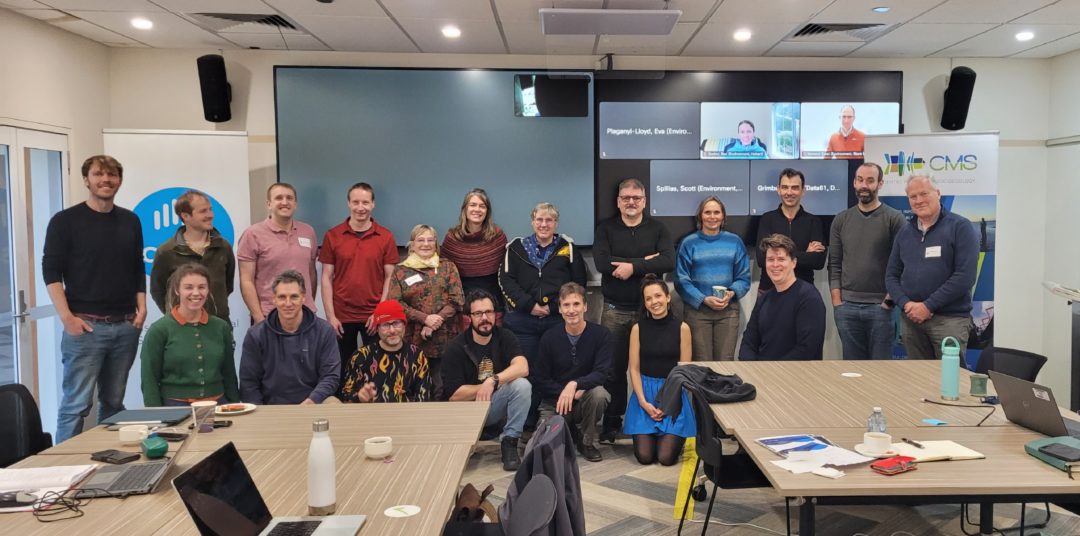
Image: Participants at the AI-Ecosystem Modelling Workshop in June 2024, co-hosted by CMS.
By Dr Danilo Urzedo (CSIRO)
Summary: Digital advancements are increasingly influencing knowledge production to suggest ways of enhancing the efficiency and precision of conservation practices and policies. From environmental big data to generative Artificial Intelligence (AI), a rising number of technological conservation developments are designed and deployed to inform decisions, mobilise participation, and automate labour-intensive tasks. By drawing on Global South perspectives of decoloniality, this talk will present formulations on environmental data justice and how data-driven AI tools shape the legitimacy of conservation expertise. While these conservation technologies seek to facilitate the accessibility and effectiveness of informed decisions, data-driven AI systems can also reinforce or exacerbate power asymmetries and critical injustices. This talk will emphasise the case of chatbot developments and their associated epistemic consequences for conservation decisions across varied contexts and sites.